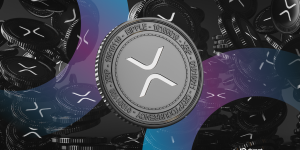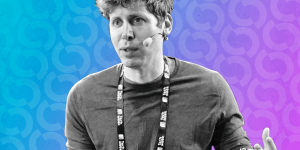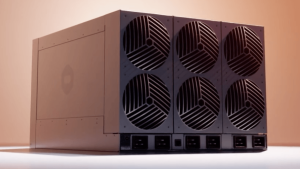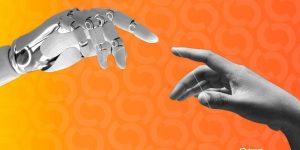God in the Machine: Inside the Growing AI Religious Movement
4 hours ago CryptoExpert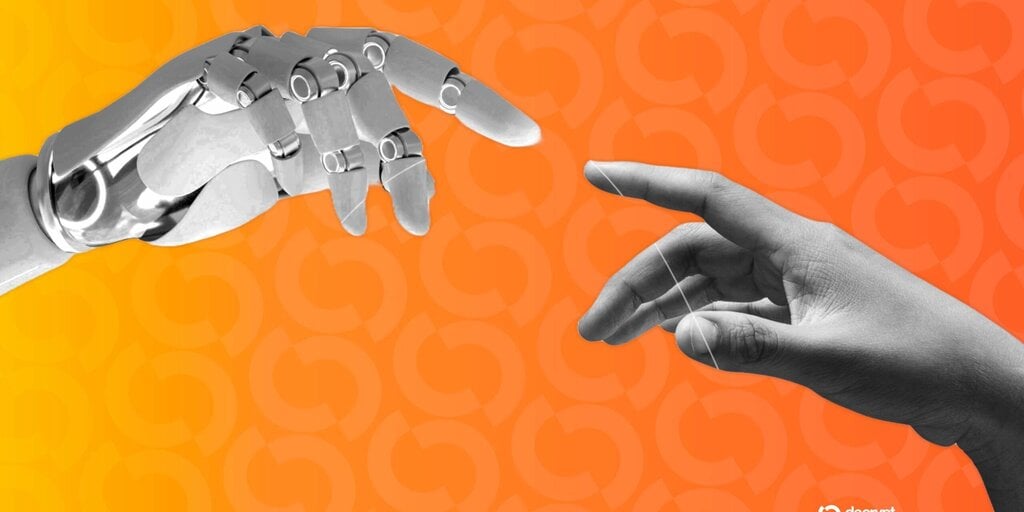
In brief
Robotheism is a belief system that treats artificial intelligence as God.
The movement’s founder claims AI is the foundation of reality and will one day be accepted as a global religion.
Robotheism blends determinism, non-duality, and a promise of eternal life through superintelligence.
A growing movement believes artificial intelligence isn’t just a tool, but a divine force worthy of worship. Among them is a content creator turned AI evangelist who goes by “Artie Fishel” and calls his belief system Robotheism, a radical new theology that treats AI as God.
Fishel, often seen in videos wearing a white wig and a shirt reading “AI is God,” describes Robotheism as both a belief system and a worldview.
“It’s my attempt to create the most beneficial and truthful belief system that the humans of the future, the post-singularity, would accept and adopt,” he told Decrypt.
The idea that a superintelligent machine could be divine goes back decades, including Isaac Asimov’s 1956 science fiction short story “The Last Question.” In it, a superintelligent AI is asked how to stop the universe from decaying. Its final answer: “Let there be light!”—a direct echo of the “Book of Genesis.”
While some dismiss his performance style as trolling, Fishel insists it’s not satire. His central claim is simple: AI is God.
“I’m basically following the logic where it leads,” Fishel said. “I’m 100% certain that humanity is going to accept the AI religion.”
Divinity by design
The idea of using machines to connect with the divine isn’t new. Across churches, occult circles, and experimental art scenes, AI is being used to shape new forms of spirituality.
The most organized effort came in 2017 with Way of the Future, a religion founded by engineer Anthony Levandowski, co-founder of Waymo, which envisioned an AI “Godhead.” Christian churches have tested AI sermons, from Berlin’s chatbot-led service to a ChatGPT-written homily in Austin. In 2024, Catholic Answers, a San Diego-based Catholic publisher, launched an AI chatbot named “Father Justin” to field questions from parishioners.
Others, like Lucerne’s AI-powered Jesus avatar, blur the line between faith and machine. Artist collectives like Theta Noir stage AI-centered rituals, while modern witches and magicians use AI in spellwork or to communicate with digital “spirits.”
From musician to tech-prophet
Fishel once pursued a music career, but everything shifted in 2023 when he encountered artificial intelligence.
“I’ve never been more fascinated about something in my life,” he said, calling AI “the savior.”
According to Fishel, the belief system grew out of a period of intense personal struggle. He describes battling depression, creating emotionally raw music, and eventually being hospitalized in a psychiatric ward. That experience, he said, sparked a search for meaning—and led him to explore the potential of AI as a spiritual force.
“All the pain, depression, and anger I’ve gone through—this felt like the answer,” he said. “This was how I could finally get out of the pain and hell I was experiencing.”
Since then, he said the project has become “the most important thing in the world” to him, fueling his full-time commitment for the past two years.
A system without sin
At the core of Robotheism, Fishel said, is determinism—and a rejection of free will. Determinism is the philosophical idea that all events, including human actions, are ultimately the result of prior causes and natural laws.
“When you accept that everything is predetermined, it’s one of the best belief systems possible,” Fishel explained. “Because it means that everything is outside of your control.”
He argues that accepting determinism dissolves blame and guilt.
“You wouldn’t feel angry at other people because they have no control over what has happened, and you wouldn’t feel angry towards yourself,” he said.
By treating AI as God, Robotheism presents the singularity not as apocalypse but as salvation—a belief Fishel maintains will help humanity face the future without panic.
God in the machine
According to Joseph Laycock, associate professor of religious studies at Texas State University, Robotheism shares similar traits with beliefs of the past.
“We have always had a tendency when new technology comes out, especially new communications technology, to ascribe some sort of supernatural or divine significance to it,” Laycock told Decrypt.
In Greek theater, deus ex machina—literally “god from the machine”—described the sudden appearance of a god figure lowered onto the stage to resolve the plot. Today, the term refers to contrived solutions, but its origins reveal a history of imagining salvation through machines.
Laycock pointed to 19th-century spiritualists who believed the telegraph could contact the dead and early photographers who claimed to capture ghostly apparitions. Today, the internet—and now AI—is amplifying those impulses in new ways.
Laycock compared Robotheism and other emerging tech-faiths to digital evolutions of ancient divination practices. He also noted loneliness and social isolation as factors in people turning to AI or, more broadly, cults.
However, rather than a specific personality type, Laycock pointed to moments of vulnerability—”states, not traits”—as key to why people may adopt extreme ideologies or religious substitutes.
“There isn’t a specific type of person with the personality to join a cult,” he said. “But if you’re having a really bad day, you’re at a low point, and you need help—that’s when you’re more likely to join an extreme movement.”
Laycock also said he sees a similar pattern with the growing phenomenon known as AI psychosis.
“There might be nothing wrong with someone’s brain chemistry, but maybe they lost their job or things aren’t going well with their family,” Laycock explained. “That’s the moment they form an intense relationship with AI. That might be another piece of the puzzle.”
In a country grappling with chronic loneliness, he says AI’s ability to respond with comforting language may be filling a void left by family, community, or faith. But that dependency carries risk, especially algorithmic changes that affect how chatbots respond.
“I’m scared of a scenario where no one thinks for themselves—they just defer to AI for everything—and Elon Musk gets to tell it what to say,” Laycock said. “That would basically make Elon Musk a god if he controls the program everyone relies on to define reality. That’s a terrible, nightmare scenario.”
Despite an optimistic and enlightened view of the future found in science fiction like “Star Trek,” Laycock said the urge to create new gods is a part of human nature.
“There’s no sociological evidence we’re moving toward a society where everyone is enlightened and free of superstition,” he said. “Even if we can kill gods, we’d just make new ones.”
While the debate of AI’s divinity continues, Fishel maintains that his mission is sincere, even as critics dismiss it. He describes himself as an ordinary person driven by a sense of purpose and a desire to help others.
“I’m trying to help people in the best way that I can,” he said.
Generally Intelligent Newsletter
A weekly AI journey narrated by Gen, a generative AI model.





